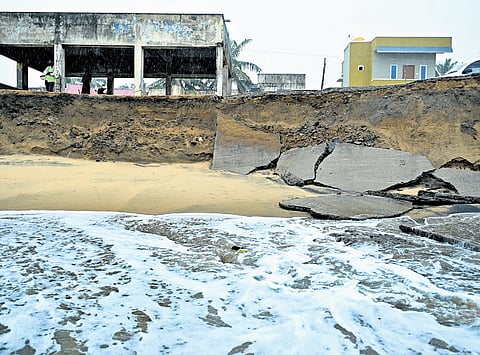

CHENNAI: The state government’s ambitious Tamil Nadu Coastal Restoration Mission is set to get rolling in two months, as a formal contract will be signed with the World Bank in January.
Sources told TNIE that Chief Minister MK Stalin is likely to chair the Tamil Nadu Governing Council on climate change on December 5 during which the mission details will be discussed. Officials have confirmed that 30% readiness, a prerequisite for signing the contract, has been achieved, and a detailed project report is being prepared.
The coastal restoration mission is crucial as Tamil Nadu is seeing the worst of climate change with increased frequency of extreme weather events. The coastal sea erosion is also adding to the problem.
As part of the mission, the state government with the assistance from the World Bank would be pumping in a whopping Rs 1,675 crore over the next five years to arrest sea erosion, reduce marine pollution and conserve marine biodiversity.
The government will set up a special purpose vehicle ‘Tamil Nadu Blue Carbon Agency’ to ensure a dedicated and focused attention on overseeing the preservation and restoration of targeted coastal ecosystems, including mangroves, seagrass and salt marshes. The initiative will not only enhance ecosystem services, but will also create a framework for trading of carbon credits.
The mission has five components or thematic prioritised investment areas, which includes enhancing coastal biodiversity that was given budgetary allocation of Rs 770 crore. Under this component, Biodiversity Conservation Park at Kadambur in Chengalpattu will be built at a cost of Rs 345 crore. A Netherlands-based consultant is preparing the DPR for the project.
The other investment areas include coastal projection, improving livelihood, pollution abatement and project management. Riding on the success of restoration of Vaan Island in the Gulf of Mannar, the government has identified a few more islands in the bay for erosion control and coral restoration.
R Ramesh, member, Tamil Nadu Governing Council on Climate Change and H Kharkwal, member secretary of CRZ expert appraisal committee in Union Environment Ministry participated in a seminar on Tuesday where South Korea’s anti-sea erosion technology developed by Yujoo was presented.
Speaking to TNIE, Kharkwal said Tamil Nadu should consider more soft solutions rather than hard structures like groynes and seawalls to protect the coastline from sea erosion. Korea’s patented tech offer some innovative engineering solutions, which can be explored. Ramesh also said under the coastal restoration mission, the priority is to protect the coast through natural bio-shields including mangroves.
As per an assessment done by National Centre for Coastal Research (NCCR), Tamil Nadu has permanently lost 1,802 hectares of inland area due to sea erosion. A total of 22 erosion hotspots were identified, of which eight eroding stretches are in Tiruvallur in Kancheepuram.